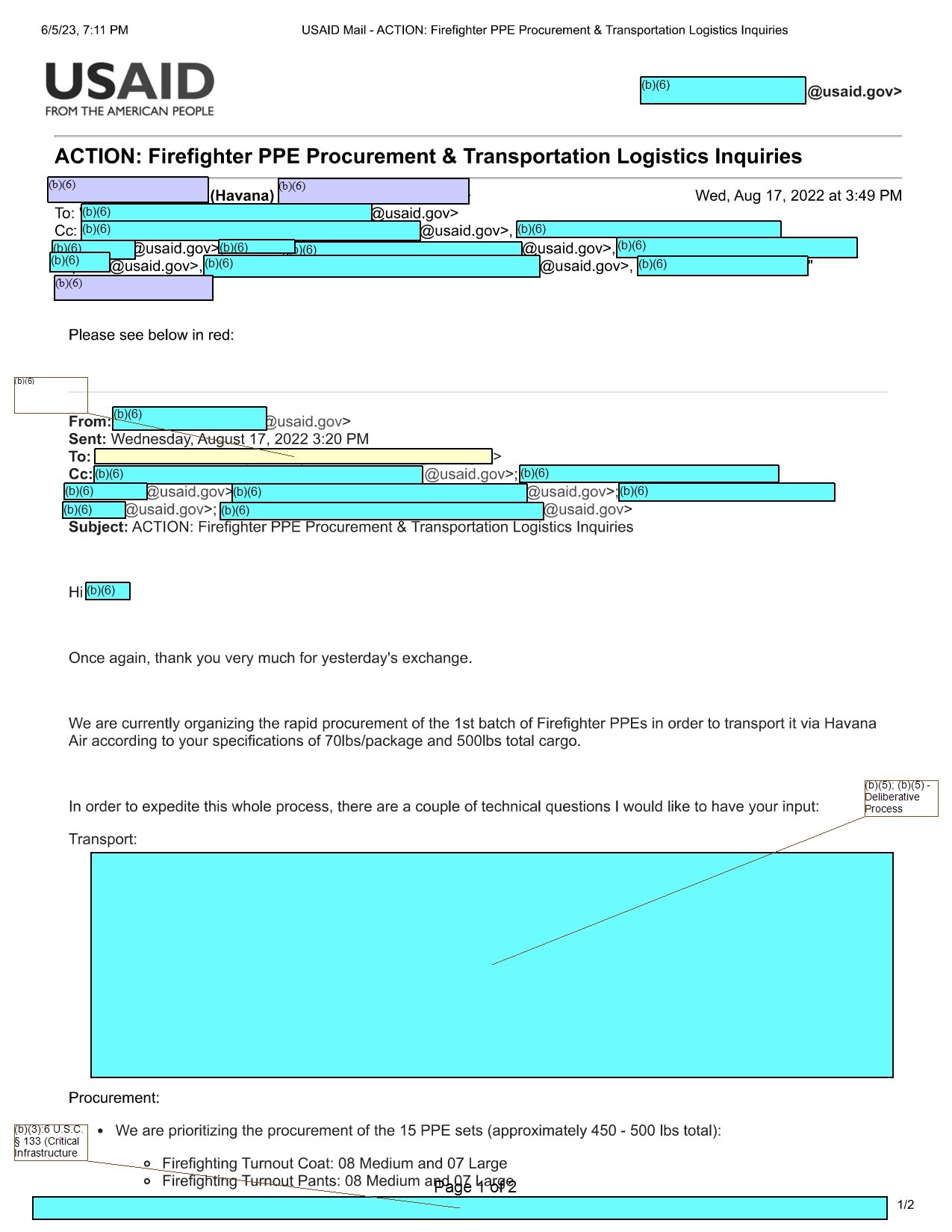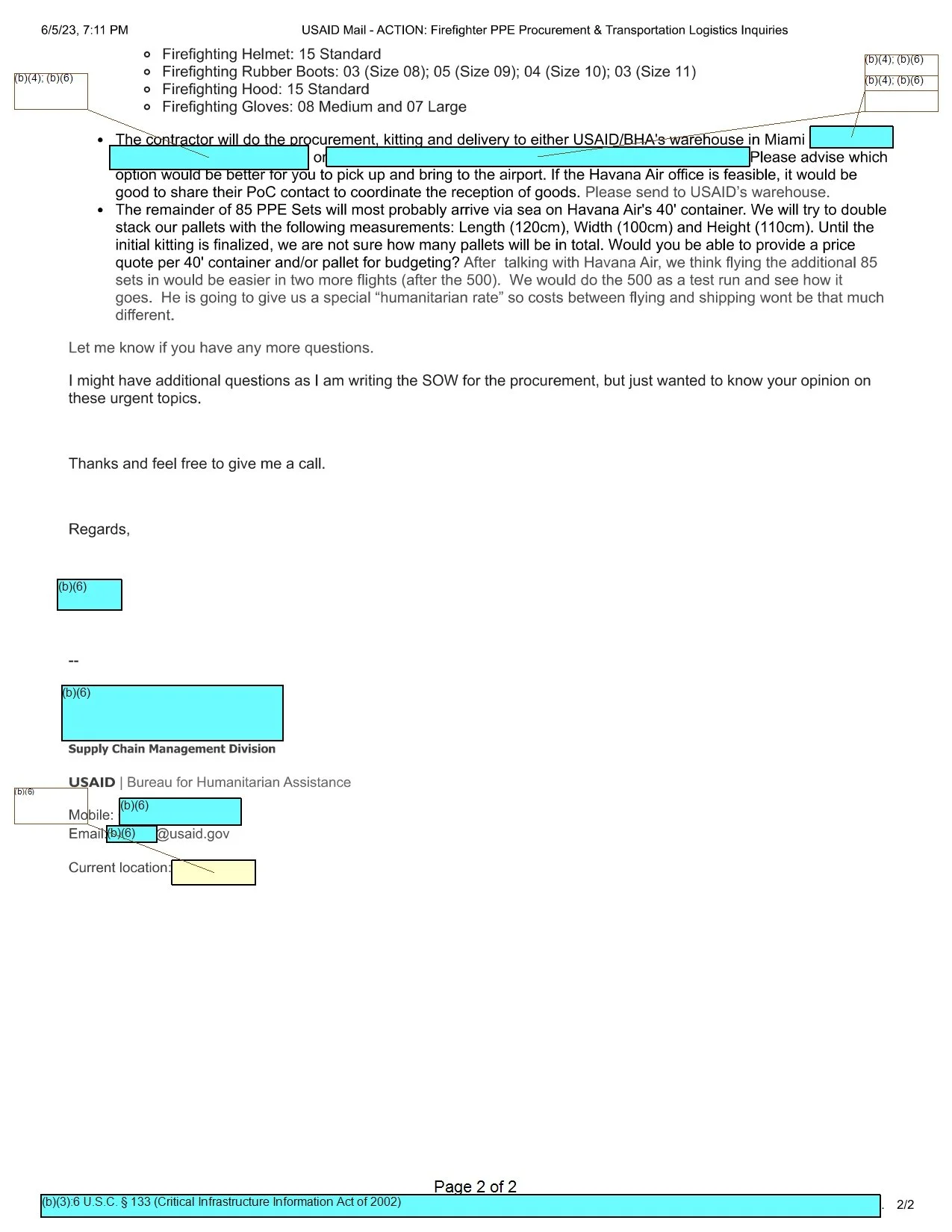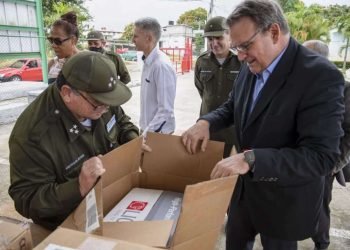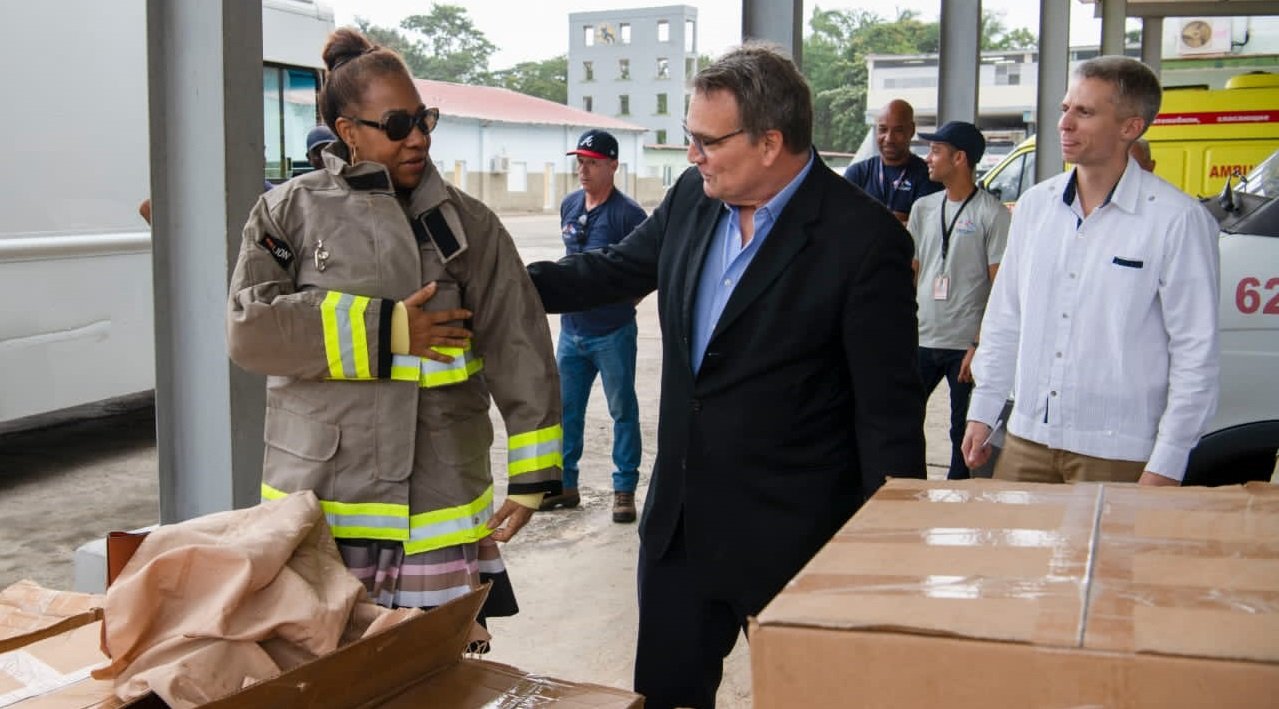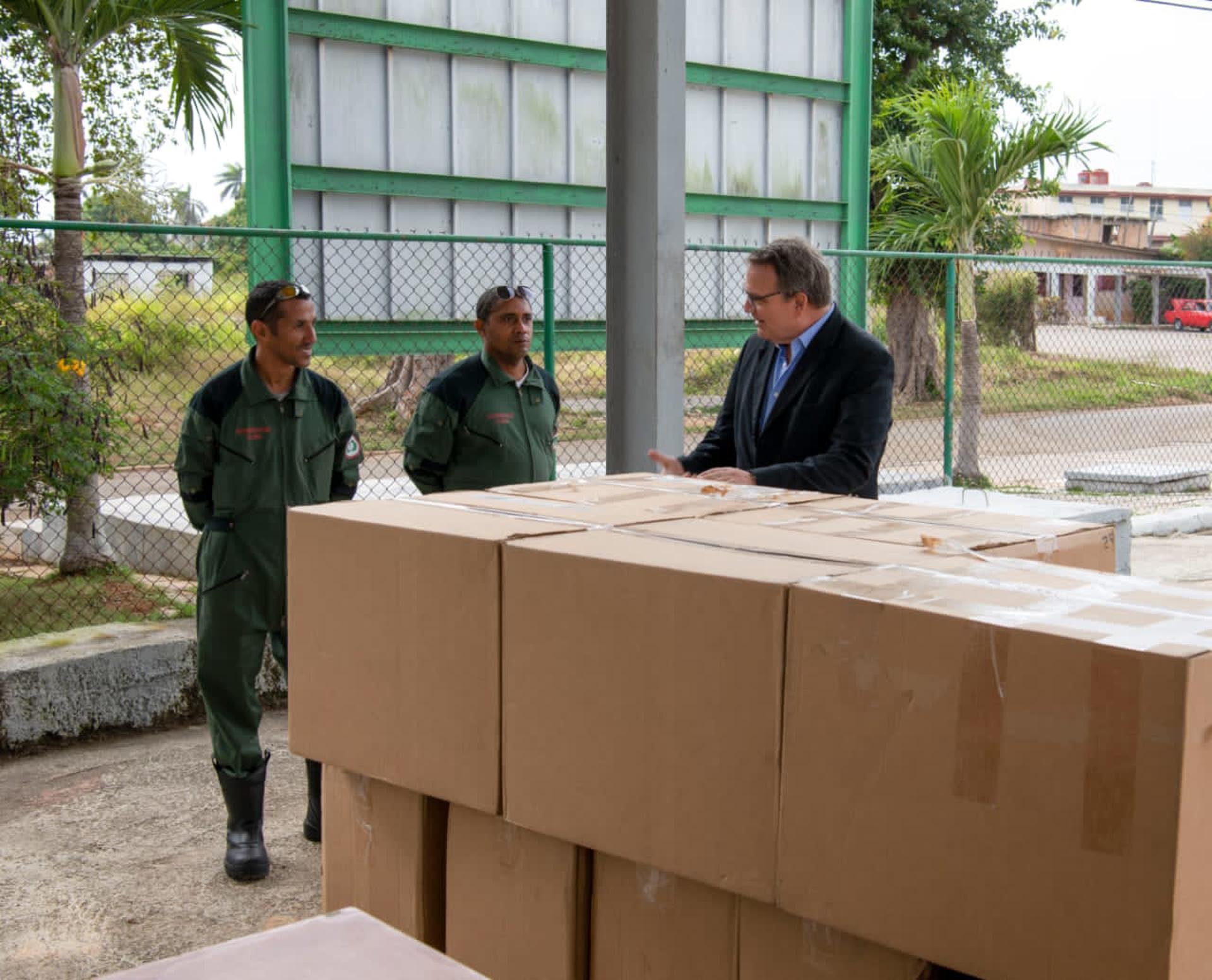Turin, Italy-based Luigi Lavazza S.p.A. (2023 revenues approximately US$3.4 billion) and Vevey, Switzerland-based Nestle SA (2023 revenues approximately US$103.9 billion) are seeking to increase the production, quality, and export opportunities for coffee beans sourced in the Republic of Cuba.
Although authorized by the Obama-Biden Administration (2009-2017) through the United States Department of State, the government of the Republic of Cuba has not authorized the direct export of coffee beans (roasted, not roasted, processed) sourced from private growers in the the Republic of Cuba to the United States.
World Coffee Portal
London, United Kingdom
19 April 2024
Inside the Lavazza project rebuilding Cuba’s coffee industry
In 2018 Italian coffee roaster Lavazza Group embarked on a 20-year project to reinvigorate Cuba’s long-lost coffee industry. Through cooperation between the non-profit Lavazza Foundation and the Cuban government, coffee is becoming a powerful force for economic and social development on the island. World Coffee Portal gained exclusive access to the programme to find out what it takes to rebuild a coffee industry from the ground up.
IMAGE: A worker rakes sun-dried coffee at the Los Negros washing station in Santiago de Cuba province | Photo credit: Lavazza Group
It’s a country synonymous with Fidel Castro, cigars and vintage cars, but coffee is unlikely to be top of mind when it comes to Cuba. Nevertheless, the picturesque Caribbean island was once a major producer, growing around 60,000 tonnes a year in its 1950s peak – comparable to modern-day Kenya – and world-renowned for its sweet, full-bodied exports.
Sadly, Cuba’s recent history as a coffee producer is one of endemic decline. Rocked by the seismic events of the Cuban revolution 1953-1959, an ongoing US trade embargo introduced in 1962 and a severe leaf rust epidemic, by the 1980s annual production had fallen to 30,000 tonnes and exports virtually vanished in the 1990s.
In 2020, Cuba’s annual production stood at just 6,000-7,000 tonnes but coffee remains an important part of daily life. An estimated 19,000 of the country’s 900,000 farmers are involved in cultivating the crop and Cubans consume around 20,000 tonnes of coffee annually, mostly imported from Vietnam and Brazil.
A cup half full
With access to global markets, machinery, finance and fuel severely restricted, Cuba’s economy struggles to develop. The country remains heavily reliant on imports and faces frequent shortages of food and medicine. Cuba was also hit hard by the pandemic, which along with tougher US sanctions introduced by the Trump administration and continued under Biden, badly impacted tourism.
With inflation running at around 30% in 2023, almost 425,000 Cubans, particularly from rural areas, are estimated to have crossed into the US from Mexico in the past two years – close to 4% of the population.
“Sanctions have a huge impact because they restrict us from working with international banks. In the rest of the world coffee producers can access finance from banks and other institutions – but this is not possible in Cuba,” says Cuban Vice Minister for Agriculture Maury Hechavarría Bermúdez.
In today’s tough economic context, Lavazza Group – a major purchaser of Cuban coffee up until the 1990s – wants to see coffee become a major catalyst for sustainable economic development in Cuba.
In 2018, the Italian coffee roasting giant launched a 20-year programme to rebuild Cuba’s long-lost coffee industry. Bio Cuba Café is a joint venture managed through the Lavazza Foundation in collaboration with the Cuban Agriculture Ministry, (GAF) and the Agency for Cultural and Social Interchange with Cuba (AICEC), an Italian non-profit fostering cultural and economic exchange with Cuba.
After several years of negotiations and on-the-ground preparation, Bio Cuba Café was officially ratified at a signing ceremony on 3 December 2023.
The programme currently represents 250 Cuban coffee farmers and has so far distributed more than six million coffee trees supported by state-backed agronomic research and €3.7m ($4m) investment from the partner organisations, including €1.5m ($1.6m) from the Lavazza Foundation.
“In the 1950s Cuba was one of the biggest coffee producers in the world,” says Robeldi Nicot Terrero President of the Agroforestal Group (GAF). “Cuban coffee has always been regarded as high-quality and that’s why we’ve been trying to improve exports.”
Today, 92% of Cuban coffee production is concentrated in the eastern provinces of Pinar del Rio, Villa Clara, Cienfugos, Sancti Spriritus, Holguin, Granma, Santiago de Cuba and Guantanamo, key regions where the government is promoting agriculture to improve local livelihoods and boost the national economy.
“When a coffee producing country starts to consumer more coffee, that’s a strong indicator of development”-Veronica Rossi, Senior Sustainability and Lavazza Foundation Manager
As a public-private joint venture with foreign entities, Bio Cuba Café is a new approach for Cuba’s state-run economy. Nevertheless, 2020 saw Lavazza purchase the first 11 containers of premium Cuban arabica along with the first export by Bio Cuba Café’s Asdrubal López enterprise and the Agroforestry Group.
“This is a social responsibility project to boost the Cuban coffee market,” says Veronica Rossi, Lavazza’s Senior Sustainability Manager and Lavazza Foundation Manager. “Lavazza Group initiated the joint venture but it is managed through the Lavazza Foundation, which has a statutory obligation to reinvest all profits.”
As Rossi explains, Lavazza is a major purchaser of Cuban coffee through the project but does not hold exclusivity on exports, enabling Bio Cuba Café to act as a portal to both domestic cooperatives and international buyers.
IMAGE: Workers weigh green coffee sacks at the Los Negros washing station in Santiago de Cuba province | Photo credit: Lavazza Group
Cuba’s arabica exports officially reached 1,200 tonnes in 2021, but of the 9,000-11,000 tonnes produced overall today, 40%-65% is estimated to be traded on the black market, where it haemorrhages value. It’s here that Bio Cuba Café is working to bring more farmers into the fold so they can invest in quality and tap into the global value chain.
Bio Cuba Café members receive over 30% of the exported value of their coffee, among the highest share in the world. They also receive payment for coffee on delivery instead of a typical six-month waiting period, gain access to bioproducts for organic and sustainable agriculture, credit funds and agronomic assistance.
Crucially, they are also paid in Cuba’s ‘hard’ Moneda Libremente Convertible (MLC) currency instead of local pesos. Introduced in 2021 as part of Cuba’s complex dual-currency system, MLC retains parity with the dollar and is used to purchase high-value imported goods, such as machinery and equipment.
In 2022, Cuba produced around 8,000 tonnes of export-grade coffee, still a small fraction of its 1950s peak, but tangible evidence of the fledgling industry’s progress.
A green light for sustainability
Michele Curto is President of the AICEC and has been closely working with the Lavazza Foundation and the Cuban government to make Bio Café Cuba a reality. Curto’s passion for the project is clear, especially when it comes to dovetailing the environmental and economic benefits of sustainable agroforestry and organic farming.
“One of the easiest ways to support a coffee plantation is to create a shade-grown system,” he says, highlighting GAF’s long-term reforestation programme, which has overseen a rise in Cuba’s total forest cover from just 13% in 1959 to 43% in 2022.
“Consider that one euro is worth around 250 pesos – with a euro or less you can buy 120 trees – it’s the cheapest way to protect the cultivation of coffee,” Curto adds.
Like all coffee producing countries, Cuban farmers face mounting challenges due to the global climate emergency. “Cuba is a dry country, but we are also facing climate phenomena such as high temperatures, heavy, irregular rains and soil erosion,” says Bermúdez.
With Cuba rebuilding its coffee industry from the ground up, there is a powerful opportunity to embed agroforestry and organic cultivation into virtually all production.
Deforesting land to increase yields is tempting for many coffee producers, but monoculture farming damages ecological diversity and requires regular pesticide treatment to control insect populations. A greener route is to plant native trees alongside coffee, which controls pests by encouraging birds, provides shade protection and retains soil quality. This dynamic is a win-win for Cuba, where there has historically been virtually no access to pesticides or chemical fertilisers due to the US trade embargo.
“We have turned this obstacle into a strength by creating bio-fertilisers to enhance production. The development of coffee in these specific eco-systems responds to the needs and progress of the country,” says Terrero. “It’s fair, good and clean,” he adds.
The Tercer Frente Experimental Coffee Station in Cuba’s Santiago province is at the forefront of efforts to integrate climate resilience into coffee production. In 2020, Cuban scientists began collaborating with counterparts in Vietnam to develop bio-organic fertilisers and rust-resistant, higher yield cultivars. Vietnamese farming techniques, such as planting two banana trees for every coffee plant, have also been adopted.
“Cuban coffee has always been regarded as high-quality and that’s why we’ve been trying to improve exports”- Robeldi Nicot Terrero, President, Agroforestal Group (GAF)
“Our public health system was able to develop its own vaccine to face the Covid-19 pandemic. That’s why the Cuban government asked those same scientists to develop our own genetic material for coffee seeds,” says Bermúdez.
Organic production could enable Cuban coffee farmers to command premium prices in international markets and up to 20% higher in Europe, which imports around one-third of annual global coffee production.
In 2022, more than 300 tonnes of Cuban arabica and robusta coffee was certified organic through Control Union. With this representing just 25% of Cuba’s exportable capacity, the potential for certifying virtually all Cuban coffee as organic is huge.
Shade-grown coffee also means both Cuban farmers and importers can trade in Europe with confidence. Incoming EU legislation requires companies importing products linked to deforestation, including coffee, palm oil and soya, to prove goods have not contributed to forest degradation and will enforce hefty fines for non-compliance.
The benefits of advanced using biofertilisers and shade-grown approach are evident, with Bio Cuba Café members yielding 0.8 tonnes of coffee per hectare compared to 0.3 tonnes for the national average.
“Those farmers able to produce more will have more revenue and they will have reasons to stay in the mountains,” says Bermúdez. “We don’t need a lot of producers, but we need the producers we have to be far more efficient.”
Money grows on coffee trees
One farmer already reaping the benefits of the Bio Cuba Café joint venture is Rafael ‘Tony’ Antonio Infante. Like many Cubans working in the agricultural sector, Tony is higher educated and has a Bachelor’s degree in economics. In recent years, Tony has shifted from cattle farming to coffee due to the crop’s higher returns and lower maintenance requirements.
A few hours’ drive from Santiago de Cuba, his 15-hectare farm also produces plantain, beans, and pumpkins. Speaking through a translator, Tony explains he first began sowing coffee in 2017 over five hectares. The results have been promising, with yields of around two tonnes per hectare over a three-month cycle – higher-than-average volumes he attributes to the use of organic manure and recycled coffee waste fertiliser alongside a 100% shade-grown system.
Tony recently sold four tonnes of high-grade organic robusta to a cooperative through the GAF Tercer Frente cooperative on behalf of Bio Cuba Café for 127,000 pesos ($1,127) per tonne – a solid return when 120 seedlings can be purchased for just €1 ($1.08). Having recently fully joined the Bio Cuba Café programme, Tony says he is planning to further hone his agronomy techniques and add three hectares of land dedicated to coffee.
Yolani Carrasana Valdez is another Cuban coffee farmer reaping the benefits of the Bio Cuba Café programme. Valdez cultivates around 4,800 shade-grown robusta coffee trees over 7.7 hectares. Using organic fertiliser developed by Bio Cuba Café over the past two years, Valdez grew almost six tonnes of coffee in 2022.
“One of the easiest ways to support a coffee plantation is to create a shade-grown system”- Michele Curto, President, AICEC
His farm also produces sweet potato, citrus and tropical fruit, however, coffee is now Valdez’ most lucrative crop, generating around 80% of the farm’s income and enabling him to employ ten workers.
From these farms and many others, coffee is transported to the Los Negros washing station in Cuba’s Santiago de Cuba province. One of 22 stations in the country, this facility processes 64% of Cuba’s current coffee production. Los Negros uses a wet process to de-pulp coffee cherries and is experimenting with fermentation on robusta micro-lots in collaboration with the University of Santiago to elevate quality.
The station is also embedding full supply chain and farm traceability into Cuban coffee production. In 2020 Bio Café Cuba began tracking soil quality, weather conditions and water usage from a range of 50 sensors in the field to build climate resilience by continually monitoring environmental conditions in real time.
Bio Cuba Café is also deploying blockchain at the processing station to generate a fully transparent supply chain. Each coffee sack is tagged to track 90 agronomic, economic and social KPIs, with the data fully available to end consumers via a QR code and app.
IMAGE: The Rolando Ayub Contramaestre coffee processing plant | Photo credit: Tobias Pearce / World Coffee Portal
The people’s product
The Rolando Ayub Contramaestre coffee processing plant in Santiago de Cuba is the site of the Battle of Mafo, one of the final clashes of the Cuban Revolution. Today, the former army barracks whirs with the gentle motion of coffee commerce, sorting, processing and packing 65% of Cuba’s annual coffee production.
The facility houses an automatic colour sorter to weed out green coffee defects while manual workers sort up to 50kg of coffee per day to produce the country’s highest export grade. It is here that Lavazza is preparing to install Cuba’s first commercial coffee roaster, which when operational in 2025 will enable more Cubans to enjoy the high-quality coffees they produce.
“When a coffee producing country starts to consume more coffee, that’s a strong indicator you have economic and social development,” says the Lavazza Foundation’s Rossi.
“A key goal of Bio Cuba Café is not to create competition between domestic and exporter markets. Whenever we export coffee, we must ensure that there will be enough for the Cuban market. We will always keep the producers front and centre,” adds the AICEC’s Curto.
Viva the Cuban coffee revolution
With Lavazza having already struck deals to sell Cuban coffee at UK supermarkets, the dream of rekindling the nation’s coffee exports is now firmly a reality. As a 20-year project, Bio Cuba Café wants to go much further towards the full restoration of Cuba’s coffee industry and plans to grow the number of partner coffee farmers to 400 over the next two years.
With the help of Lavazza’s 130 years of coffee expertise, Bio Cuba Café is laying the groundwork for a coffee industry truly built for the 21st century. It will take many years for Cuban coffee farmers to hone their skills to boost quality and yields. However, a speciality range scoring 81-85 points already available through the Bio Cuba Café programme is tangible proof that Cuban coffee can once again compete with the best on the world stage.
20 years of the Lavazza Foundation: Established in 2004, the nonprofit Giuseppe e Pericle Lavazza Foundation has organised 33 projects in 20 countries and three continents, the benefits of which are felt by more than 180,000 coffee growers. One aim shared by all of the programmes is the development of sustainable entrepreneurship, to bring about an improvement in the living conditions of the entire community. The Foundation supports the autonomy of local communities by emphasising the value of female workers and involving the younger generations. It encourages good agricultural practices in order to improve crop yields and coffee quality and promotes the introduction of technological tools as a means to counter the effects of climate change.
This article was first published in Issue 18 of 5THWAVE magazine.
Link To Article Text
LINKS To Previous Analyses
Nestle Nespresso To Indirectly Import Coffee From Cuba To USA June 20, 2016
UPDATE: “Hecho En Cuba” Has Value…. Obama Administration Will Help & Accept Certification From Cuba July 14, 2016
“Hecho En Cuba” Begins To Mean Something…. Is The Obama Administration Complying With Its Regulations? July 06, 2016
It's Here... Nespresso's Cafecito de Cuba capsules... US$1.25 each August 18, 2016
Lavazza From Italy & Nespresso From Switzerland Vie For Cuba's Coffee Production/Exports September 17, 2017
Confiserie Sprungli AG & Dieter Meier Of Switzerland Use Cocoa Beans From Cuba June 20, 2018
Nespresso Of Switzerland Announces Another Release Of Coffee From Cuba November 19, 2018
Might Cubaexport In 2020 Permit “Independent Entrepreneurs” To Export Coffee Beans, Cocoa and Honey To The United States? January 14, 2020
After A Long Wait... Nespresso Of Switzerland Announces "For A Limited Time" New Releases Of "Cafecito de Cuba" & "Cafe de Cuba" August 12, 2020
Coffee & Charcoal Have Been Imported From Cuba; U.S. Companies Want More. Agricultural Commodities/Food Products/Healthcare Products Have Been Exported To Cuba; U.S. Companies Want More. October 02, 2021
Ag Delegations Traveling To Cuba Must Know What Is Possible, Advocate To Government Of Cuba To Permit All That Is Permissible- Direct Export Of Coffee, Cacao, Honey. Complaining Not Constructive. April 14, 2022
With Coffee Bean Sourcing In Cuba, No Cuba Mention Might Be U.S. Compliance Issue For Nestlé Nescafé Plan To "Drive Regenerative Ag, Reduce Greenhouse Gas Emissions, Improve Farmers’ Livelihoods" October 04, 2022









